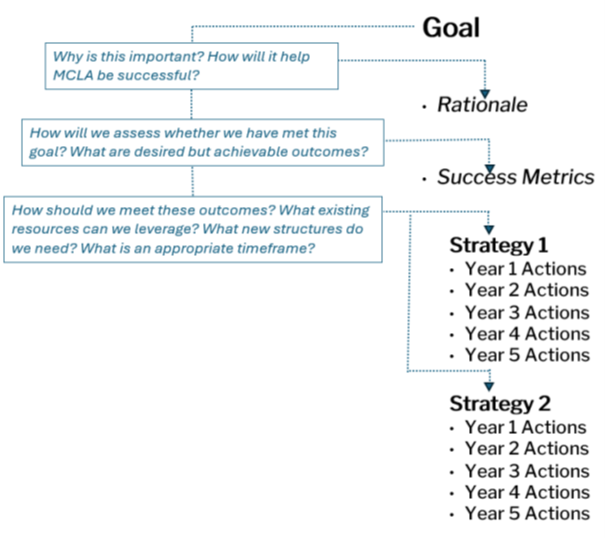Strategic Plan 2025-30
Massachusetts College of Liberal Arts has launched Finding Our Voice; a strategic framework built around three core goals. Building on the success of our previous Strategic Plan Think Differently: Learning and Teaching for a Changing World, this plan reimagines the role of a liberal arts college in today’s world. Informed by broad collaboration the plan reflects the voices of students, staff, faculty, and partners and will guide our work until 2030.
Beyond the ability to help an institution move forward, a strategic plan serves as a point of integration for all campus planning activities. Annual reporting, academic planning, financial planning, and even facility master planning should connect with the campus’ strategic plan. A well-designed plan and its results can help show how campus efforts are connected to meet both short and long-term goals.
This plan is a call to action. It captures the voices, hopefulness, and aspirations of many members of our campus community. It presents all of us with an opportunity and responsibility. We invite you, in the spirit of hopefulness and possibility, to join in “Finding Our Voice” to realize a bold vision for the future of this remarkable institution.

Finding Our Voice
I am pleased to share with you MCLA’s 2025 – 2030 Strategic Plan. This document is the culminationvof an inclusive process that began in March 2024. Led by a 24-person steering committee representing all segments of the college community, the process generated valuable input through outreach and engagement opportunities that included open forums; surveys of students, faculty, staff, alumni, and community members; a day-long, campus, open meeting including small group interviews; individual interviews with community members, and many steering committee meetings all culminating in this plan.
Guided by our distinctive public liberal arts mission, this strategic plan reflects MCLA’s deep commitment to academic excellence, innovation, and belonging. The plan represents a call to action, urging us all to challenge assumptions, think creatively about our work, and act strategically in pursuit of our shared goal of making MCLA a stronger, more accessible and student-centered institution. The result of the visioning, goal setting, and planning we undertook is a document, a living plan, which will engage all members of our college community over the next five years.
As we celebrate a decade of U.S. News & World Report ranking MCLA among the Top Ten
Best Public Liberal Arts Colleges with an excellent reputation for providing an affordable,
high-quality education, MCLA is ready to achieve great things as we continue to be
among the best public liberal
arts college in the nation.
Over the next five years, we will create new educational opportunities for our students and new professional opportunities for our faculty and staff. We will emphasize the importance of communication; we will share MCLA’s story and values more widely. We will ensure that access and belonging are defining characteristics of an MCLA education and recommit to providing a holistic xperience for all students.
A key component of this plan is the establishment of a protocol for regular review and reflection. This process will allow us to assess our progress, make necessary adjustments, and remain aligned with the dynamic needs of our community.
I am impressed by the work of so many that created this plan that calls us to Find our Voice and reaffirm our distinctive mission and commitment as the public liberal arts college for the Commonwealth. The plan will keep us focused, inspired, and in pursuit of excellence.
I am confident that we will work together as a community to advance these goals and enhance the positive impact MCLA already has – on our students and their families, our 21,000 alumni, our faculty and staff, our city and the region, as well as the Commonwealth. I am excited about MCLA’s future and by the collaboration of my colleagues to achieve these goals.
Founded in 1894, Massachusetts College of Liberal Arts (MCLA) has long been recognized as a leading public liberal arts institution in the United States. Ranked as one of U.S. News & World Report’s 2025 Top Ten Public Liberal Arts Colleges in the country, MCLA currently enrolls 1,000 students annually in 70+ undergraduate and graduate programs and boasts an alumni network of over 21,000 strong. As MCLA celebrates its 130th anniversary, the institution looks to leverage its long-standing success as a trailblazer in providing a high-quality, affordable liberal arts education while continuing to grow its impact with students from Massachusetts and nationwide. Further, MCLA is committed to continually evolving and growing its signature programming to address the unique characteristics of the 21st-century academic and career preparation landscape.
As such, College leadership reached out to Luminary Evaluation (“Luminary”) in the spring of 2024 for assistance in developing a Strategic Plan designed to carry the school forward and continue to grow its impact over the next five years. Luminary, based in the Berkshires, “works with clients to prioritize critical data and organizational direction that helps them move forward thoughtfully.” Luminary has worked with a number of regional and national educational organizations as they develop strategic plans and facilitate planning processes. For MCLA’s Strategic Plan process, Luminary assisted with data collection and group facilitation.
The strategic planning process began with the development of an internal 24-member Strategic Plan Steering Committee that worked closely with Luminary to conduct an extensive SWOT analysis and community needs assessment. Almost 600 responses were collected from a broad body of stakeholders, including students, alumni, faculty & staff, and external community members. This resulted in a diverse and comprehensive perspective on the College’s current function and future priorities. The SWOT analysis was bolstered by campus focus groups conducted in late spring 2024. Nearly 120 faculty, staff, and trustees participated in these focus groups. This rich pool of data was distilled and prioritized into Guiding Principles that informed the crafting of the Strategic Plan; the latter is comprised of three overarching Goals, with Success Metrics, Strategies, and Actions for each Goal. The details of each phase of the Strategic Plan process—Community Assessment Process and Findings, Guiding Principles, and Strategic Plan Design and Overview—are described in the sections below.
The strategic planning process began with a community assessment designed to identify the College’s current strengths, challenges, aspirations, and opportunities as viewed through the lens of a broad range of community stakeholders. Specifically, the Strategic Plan Steering Committee sought to compile answers to the following key questions:
- What is MCLA’s critical value?
- What are MCLA’s greatest strengths and vulnerabilities as an institute of higher learning?
- What best practices in academia are currently in use at MCLA? In what areas could MCLA improve?
- How is MCLA differentiated from other similar institutions in the region, state, or nation?
- Why do/don’t students and faculty choose MCLA over other schools in the region?
- Are key organizational decisions shared by a diverse group of individuals?
- What are the relevant regional, state, and national ecosystem trends that could affect MCLA’s success, growth, and sustainability?
- Who is the ‘typical’ MCLA student? What do they value most?
- What are the greatest needs MCLA currently serves and what are the most significant unmet needs MCLA would like to serve?
- Which goals from the previous strategic plan have been most successful? Which have yet to be fully addressed? Have priorities shifted, and if so, in what way?
- What is the greatest potential impact(s) MCLA can have? How will impact be measured?
- What new resources are needed to achieve impact?
- How can existing resources evolve or be transformed to realize the desired impact on the community MCLA serves?
To develop robust and comprehensive answers to these critical questions, the Strategic Plan Operations Team (a subset of the Steering Committee) worked with Luminary Evaluation to develop both quantitative and qualitative data collection protocols designed to collect perspectives from a diverse range of participants, including students, faculty and staff, alumni, regional community leaders, and representatives from peer institutions. The assessment methodology relied on quantitative and qualitative data gathered through a community-wide survey, focus groups, and one-to-one interviews to ensure all stakeholders had ample opportunity to share their perspectives.
In total, 587 individual community responses were collected, which included 26 individual interviews with 15 faculty and staff, 9 community members, and 2 representatives from K-12 partners. It also comprised two student focus groups with 11 participants and six faculty and staff focus groups with 116 faculty and staff participants, as well as a community survey which garnered 434 responses, including 120 students, 85 faculty, 109 staff, 221 local community members and 120 alumni (respondents identified with multiple categories).
The resulting data was analyzed by Luminary to identify the opportunities to leverage current institutional strengths and maximize MCLA’s future impact on the state and national postsecondary landscape.
Analysis of the Community Assessment data began with the compilation and distillation of the large amount of feedback into key observations. This helped to guide the Strategic Plan Steering Committee in fully understanding the collective perspective on current institutional functions, as well as MCLA’s role within the landscape of higher education. The 12 observations are listed below:
Observation 1: Most stakeholders are satisfied with their overall experience at MCLA. The College’s
small size, affordability, supportive faculty and staff, and the opportunity to build
personal relationships campus-wide are commonly cited as the school’s greatest strengths.
Observation 2: Most students and alumni report high-quality academic instruction at MCLA, noting
interactions with faculty, library services, and instruction as particular strengths.
However, stakeholders also report the need for increased academic support for struggling
students.
Observation 3: All stakeholders identify the MCLA model as a primary asset to the state’s higher
education system; however, there is a considerable need to define MCLA's educational
niche further and align accordingly.
Observation 4: Stakeholders report gaps in quality-of-life factors as a major detractor to the campus
experience for current and prospective students. Furthermore, these issues have been
found to negatively impact student retention.
Observation 5: Stakeholders, particularly faculty and staff, report opportunities for greater transparency
and more frequent communication with institutional leadership.
Observation 6: While some stakeholders report progress towards building a campus wide culture committed
to Diversity, Equity, Inclusion, and Belonging, others feel that considerable effort
is still required to meet institutional goals in this area.
Observation 7: All stakeholders identified the lack of transportation options as a primary detriment
to multiple areas of the student experience.
Observation 8: Stakeholders presented mixed findings regarding the sense of community and belonging
on the MCLA campus.
Observation 9: Stakeholders identified post-graduate preparation for MCLA students as an institutional
strength; additionally, some expressed that students would strongly benefit from increased
support from the Office of Career Services and within some academic departments.
Observation 10: Some stakeholders reported that the accessibility of mental health support at MCLA
is currently sufficient to meet student needs; others reported that an increase in
services should be a top priority for the school.
Observation 11: Employees feel well-supported by the administration in many areas; however, some
faculty and staff report experiencing significant levels of burnout.
Observation 12: While stakeholders view MCLA as an asset to the local community, positive relationships
have been inconsistent, and many noted the opportunity to improve in this area, which
has serious potential to benefit the student experience.
Utilizing these findings, the Strategic Plan Steering Committee engaged in a prioritization process to identify the opportunities inherent within the observations and select the Guiding Principles most likely to produce an outsized impact within the designated five-year span.
The next step of analysis involved the prioritization of the observations into four guiding principles that stakeholders identified as critical to informing the development and implementation of each goal, strategy, and action included in the 2024 MCLA Strategic Plan. Expressly, the broad community response indicated that each component of the finalized plan should contribute to the following efforts:
- Establish the College’s most critical institutional priorities and subsequent alignment of all campus components.
- Leverage MCLA's foundational strengths (mission-driven faculty and staff, personalized student instruction, geographic location) to ensure continued success and access to untapped potential.
- Coordinate efforts across all departments to facilitate effective retention of faculty, staff, and students.
- Implementation of the diversity, equity, and inclusion framework into all facets of college functions.
Finally, through a series of six Luminary-led planning sessions, the committee collaborated in the development of three primary strategic Goals, as well as the accompanying framework of metrics, strategies, and actions necessary to most efficiently and effectively bring the goals to fruition.
Using the guiding principles mentioned above, the Strategic Plan Steering Committee worked with Luminary to collaboratively develop
- Overarching Goals (three in total, with a rationale for each)
- Success Metrics to define success and assess how a Goal will be met
- Strategies to meet the Success Metrics
- Detailed Actions, broken down by year, to enact a given Strategy
These will empower MCLA to further deepen and expand its critical mission in the coming years. A schematic of the Strategic Plan layout is shown below:

Goals, Strategies, and Actions
The Massachusetts College of Liberal Arts will realize its’ foundational mission of
providing equitable access to a high-quality, affordable liberal arts education by
focusing efforts and prioritizing resources on achieving three primary goals, identified
by The Strategic Plan Steering Committee, over the period of five years:
Refine and promote MCLA’s distinctive public liberal arts mission and vision in response to the evolving role of higher education and align key institutional decisions and resources accordingly.
Build responsive and sustainable institutional structures and practices to increase access, belonging, and success for all members of the MCLA community, with particular focus on those traditionally excluded from higher education.
Strengthen and develop innovative initiatives that enhance the holistic student experience and cultivate a campus culture responsive to student voice.
This plan looks to improve upon and maintain MCLA’s commitment to access and affordability, social mobility, as well as retention and graduation rates for students. It seeks to grow enrollment and retention, especially among students traditionally excluded from higher education, continue to invest in student experiences, and leverage our affordability along with our social mobility rating.
Goal 1 focuses on enhancing our mission as the Commonwealth’s only public liberal arts college by refining our mission, vision, and definition of the liberal arts, developing institutional learning outcomes, rightsizing our budget, and increasing enrollment and retention across populations.
Goal 2 looks specifically at access and inclusion as MCLA strives to build on recent gains among students traditionally excluded from higher education. This includes ensuring alignment with the DHE’s Strategic Plan for Racial Equity, access to High Impact Practices for all students, increased belonging and success initiatives, and strengthening partnerships with local schools and Community Based Organizations to increase retention and belonging.
Goal 3 is focused on enhancing the student experience and promoting student voice institution wide. The College will increase the number and type of leadership opportunities available to students, develop structured milestones that each MCLA student will experience, and expand and upgrade student programming and facilities.
Additionally, the Strategic Plan Steering Committee worked to develop an implementation plan to guide communication and dissemination of this document and designate a protocol to ensure regular review and reflection upon the goals, strategies, and actions.
implementation
The MCLA Strategic Plan will serve as the guiding document for institutional decision-making and prioritization for 2025 through 2030. Critical to these efforts will be the immediate appointment of a Strategic Plan Implementation Team, which will include a diverse range of stakeholders representing broad expertise and perspectives. Within 30 days of plan approval by the Massachusetts Department of Higher Education (DHE), the Implementation Team will be convened, and subcommittees will be formed to focus on specific goals and strategies. The Implementation Team will also coordinate a celebratory Strategic Plan launch, designed to introduce the document to internal and external stakeholders and engage the community in conversation.
The Implementation Team will hold the primary responsibility for ensuring forward movement on all strategies and action steps outlined within, including monthly meetings to monitor progress and refine the plan as needed. Following the initial launch, the Implementation Team will also develop a detailed communication plan to ensure quarterly updates are shared with MCLA and local communities, using multiple channels, including institutional newsletters, the school website, social media platforms, and in-person town halls. MCLA executive leadership will take responsibility for communicating all progress updates to the Board of Trustees at their regularly scheduled meetings.

